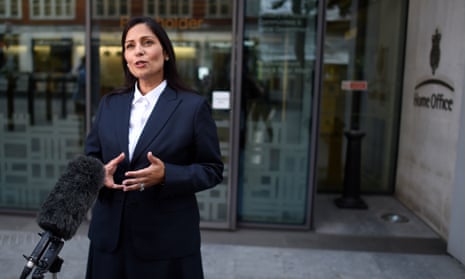Priti Patel’s appointment as home secretary has been met with an outpouring of “extreme concern” over her hard-right record on key issues covered by her new brief.
Patel – who was forced to resign from government two years ago after it emerged that she had held secret, unofficial meetings with Israeli ministers, businesspeople and a senior lobbyist – will be responsible for immigration, crime and policing, counter-terrorism and drugs policy.
The Essex MP, whose Gujarati Indian parents migrated to the UK in the 1960s from Uganda just ahead of Idi Amin’s decision to deport all Asians, has voted for a stricter asylum system, stronger enforcement of immigration rules, and against banning the detention of pregnant women in immigration jails.
She backed the key components of Theresa May’s hostile environment policies, presented in the immigration bills of 2014 and 2016, such as rent, work and bank account checks, all of which led to members of the Windrush generation being wrongfully told they had no lawful right to live and work in the UK.
Her views on asylum will be watched closely by campaigners and charities that work closely with asylum seekers and refugees, many of whom have been calling for the government to relax rules on asylum seekers’ ability to work in the UK, extend the time refugees are given to find work and a home before they are cut off for government support, and to expand pledges to resettle displaced persons.
Clare Collier, advocacy director at the human rights group Liberty, said: “Priti Patel is a politician with a consistent record of voting against basic human rights protections. For her to be put in charge of the Home Office is extremely concerning.
“The new home secretary needs urgently to put human rights at the heart of Home Office policymaking and reverse the damage caused by Theresa May’s most toxic legacy – the hostile environment.”
Satbir Singh, chief executive of the charity the Joint Council for the Welfare of Immigrants, said: “We’re a year on from the Windrush scandal and Theresa May’s departure creates a real opportunity to fix a chaotic and inhumane Home Office and build a fair immigration system that works for everyone.
“Priti Patel’s record doesn’t inspire confidence, but we urge her to prove us wrong by committing to end the universally unpopular hostile environment, to reject the politics of scapegoating and demonising migrants and to rebuild trust by creating a Home Office that welcomes and supports those who move here.”
Stephen Hale, chief executive of Refugee Action, said: “The new home secretary must get to grips now with the long-running crises that have gripped the Home Office and done so much damage to vulnerable people.
“The Windrush review must be published as soon as possible and lead to a new commitment to treat people seeking asylum, and all others, with the respect and dignity they deserve.”
Alluding to the reasons for Patel’s resignation two years ago, Tory peer Sayeeda Warsi said Patel’s was a “disturbing appointment at a critical time for the Middle East”.
Underlining her reputation for being tough on criminal justice issues, Patel has submitted several written questions to the Home Office on the issue of foreign national offenders and their deportation.
Not long after she was elected to the House of Commons, she appeared on Question Time and revealed her support for the reintroduction of capital punishment in the UK, a position she later said she no longer held.
Her views on the death penalty will be of particular concern to civil liberties groups that were alarmed by Javid’s decision not to seek a “death penalty assurance” from the US in the case of two Isis executioners. Alexanda Kotey and El Shafee Elsheikh are alleged to have been members of a four-man cell of Isis executioners in Syria and Iraq responsible for killing a number of high-profile western captives.
It emerged last year that Javid had written to Jeff Sessions, then US attorney general, to confirm that the UK would not be seeking an assurance in the case of Kotey and Elsheikh.
The Liberal Democrats’ home affairs spokesman, Ed Davey, said: “The job of the home secretary is to keep our country safe and ensure that everyone’s rights are respected.
“But now we have a Conservative home secretary who voted against allowing same-sex couples to marry, has argued that it is wrong for citizens to hold the government to account through the courts, and is one of the most enthusiastic advocates of Brexit – which would rob British police of the European arrest warrant and other crucial crime-fighting tools.
“The Liberal Democrats demand better from a home secretary. We will always fight to protect the rights of every individual, to give our police the tools and resources they need to prevent crime and keep communities safe, and to stop Brexit.”
Patel, an ardent Brexiter, has advocated a skills-focused immigration system, which ultimately was reflected in the immigration white paper published under her predecessor Javid’s tenure as home secretary.
Boris Johnson also backed a skills-focused immigration system in his recent campaigning, championing the oft-cited Australian points-based system but offering little further detail.
In an article for Conservative Home written in April last year, she set out her vision for immigration post-Brexit. “As a country, we recognise the immense benefits that migration has brought to our economy and society,” she wrote.
“As the daughter of a migrant, I know the sanctuary, welcome and opportunities that Britain provides. Regaining control of our borders does not mean slamming the door shut and, as we approach the final year of our membership of the EU, Britain can show leadership by mapping out a positive future for our immigration system.
“Britain must always be fair, and give refuge to refugees from conflicts and humanitarian crises. We have always had a strong record in this area, and this is the ultimate test of our civility and our humanity as a nation.”
